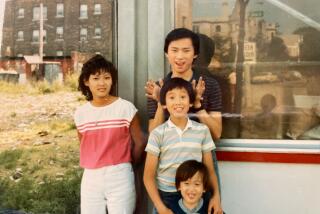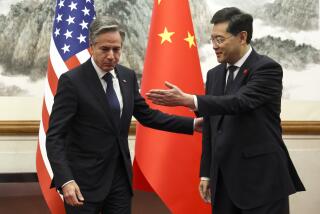A Family Older Than the Magna Carta : ANCESTORS 900 Years in the Life of a Chinese Family <i> by Frank Ching (William Morrow: $22.95; 512 pp., illustrated) </i>
- Share via
In 1604, shortly before the first permanent settlers in America arrived at Jamestown, a fabulously wealthy Chinese mandarin named Qin Yao died. More than 300 years later, in 1985, Frank Ching, an American Chinese journalist descended from Qin Yao, discovered his grave. Ching also found a young peasant woman whose ancestors had been given a plot of land near the grave in the early 17th Century in exchange for tending the tomb in perpetuity.
“Incredibly enough,” Ching writes in “Ancestors: 900 Years in the Life of a Chinese Family,” her family had been caring for the grave site right up to the Cultural Revolution in the late 1960s when Red Guards pillaged it. For more than a dozen generations, Ching found, “They had continued to discharge their obligations despite changes in dynasty, revolutions, wars and natural disasters.” Ching’s discovery of the grave and the peasant woman was a stunning reminder of the continuity of Chinese society, of its heavy specific gravity that remains today even with the advent of the Communists.
This sense of the continuity and cohesion of China is a rich theme that animates “Ancestors,” making it more than just a colossal chronicle of Ching’s roots. From the first ancestor he is able to trace, Qin Guan, a poet, scholar and official born in 1049, before William the Conqueror sat on the English throne, Ching encounters a society that is remarkably similar to China today.
It is a society where the family is almost a religious institution, where propriety and appearance are crucial, where education is revered and where political factionalism constantly endangers officials. One generation after another of his forebears struggled to pass the imperial examination system, the highly sophisticated and burdensome series of written tests that provided entry to official rank, only to fall victim to palace intrigue. “Keeping company with the emperor is akin to keeping company with a tiger,” runs an old Chinese adage, and one of his ancestors was demoted merely for making what amounted to a spelling mistake when charged with supervising a set of exams. Another was imprisoned, tortured and interrogated for more than four years in the early 18th Century because he happened to be the tutor of a prince who lost out to another brother in a succession struggle to the dragon throne.
Transcripts of some of the interrogations have been preserved and read much like the “struggle sessions” the Communists have employed on their enemies. “There is still much that you have not disclosed,” the inquisitor intoned toward the end of one session. “I will give you time to think. Then confess item by item. If you try to conceal anything from us, we will torture you severely.” Qin Daoran, the unlucky official, replied in typical humble language: “I deserve 10,000 deaths. Now the imperial court has ordered an investigation. If I tell the truth, I shall live; if I lie, I shall die. This is most magnanimous. Though I am only an animal, I can think and I am grateful to His Majesty for not executing me.”
“Ancestors” grows out of an effort by Ching, who was born in Hong Kong, to recover his unknown past. The son of a lawyer from Shanghai who was 44 years old when he married his mother, then only 16 years old, Ching had a lonely, troubled childhood. His family had fled to Hong Kong to escape the Communist takeover in 1949, but his father by then had become a sick, querulous old man given to living in a pitch dark apartment full of rats and afraid that his younger and attractive wife wanted to kill him. The old man, who had two previous wives, one of them a beautiful courtesan, gave up his work in Hong Kong, and the family fell into poverty, increasing Ching’s sense of alienation. He knew almost nothing about his large gathering of brothers and sisters--some of them older than his mother--left behind on the mainland. He longed for the security of a past he had never known.
His search for his past was in the best Chinese tradition, for one of the most insulting comments to a Chinese is that he has “forgotten his origins.” In his quest, Ching was helped by the Chinese penchant for compiling clan records, detailed genealogies. Some of these had been lost, others destroyed during the Cultural Revolution. But Ching found others scattered around the world, from a sister on Taiwan to a library at Columbia University to a zealous Communist official who shared his passion for the Qin clan. (The family name is pronounced like our word chin.) The spelling with initial q comes from the Communists’ new system of Romanization. Ching is an earlier and unofficial spelling the family itself used.)
Ching was also helped in his task by his profession. He had become a correspondent for The Wall Street Journal, and in 1979, after the United States normalized relations with the People’s Republic, he was among the first group of American correspondents to open bureaus in Beijing. Eventually he left the paper to devote full time to his study.
Even more fortunate, the Qin family turned out to be one of the most illustrious in Chinese history. Its founder may have been the first emperor of China, Qin Shi Huang, in the 3rd Century BC, from whom the word China derives. During the Qing dynasty, from 1644 to 1911, four successive generations of Qins scored so high on the imperial exams that they were appointed to the Hanlin Academy, an elite professoriate that served as advisers to the emperor. Only one other clan did better. The Qins were so highly esteemed that on several occasions, the emperor stayed at their ancestral home in Wuxi, near Shanghai, a signal honor.
“Ancestors” is a heroic effort to recapture this past. There is no equivalent in any other culture that reaches so far back in time. To put it in Western terms, a family would have to be living in, say, San Diego since before the Magna Charta. They would have had to produce the equivalent of several prime ministers of Britain, a poet like Shelley, a general on the order of Sherman, a millionaire like J. P. Morgan and, oh yes, have sent 20 straight generations of offspring to Harvard.
Unfortunately, “Ancestors” also requires a heroic reader to plow through the sometimes plodding narrative, which tends to bog down in lengthy lists of Chinese names, dates, places, official titles and literary allusions. These can be charming; they can also be deadly for the uninitiated. Qin Yao, for example, a 16th-Century worthy, served variously as the right supervising secretary of the Office of Scrutiny of War, left supervising secretary of the Office of Scrutiny for Punishments, chief supervising secretary of the Office of Scrutiny for Personnel, vice minister of the Court of Imperial Sacrifices and an official of the Court of the Imperial Stud and the Court of Imperial Entertainments. When Ching’s family flees Shanghai for Hong Kong to escape the Japanese at the outset of World War II, he relates that after they disembarked, the ship continued on to Venice, Trieste, and Brindisi by way of Singapore, Colombo, Bombay and Port Said. It almost seems the author cannot bear to let go of a single fact he uncovered.
Another shortcoming is that because clan histories largely excluded less virtuous members and contained little about women beyond their names, the book tends to be a recitation of the careers of distinguished men.
Nevertheless, the Qins often emerge as engaging characters and their lives offer unusual insight into Chinese culture. Qin Huitian, an 18th-Century notable who rose to be vice minister of punishments, once had to resolve the case of a man who fatally stabbed his wife and wounded her lover while they were engaged in an act of adultery. He was arrested, not for killing his wife, but for the injury to her lover, who turned out to be his uncle. By Confucian precepts, it was a grievous offense to raise one’s hand against one’s elders. The uncle was condemned to death for adultery; the husband for having struck his uncle. But when the case came to Ching’s ancestor for review, he found a loophole that allowed the husband to be pardoned. The emperor was pleased with his reasoning.
More to Read
Sign up for Essential California
The most important California stories and recommendations in your inbox every morning.
You may occasionally receive promotional content from the Los Angeles Times.













